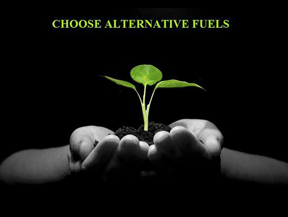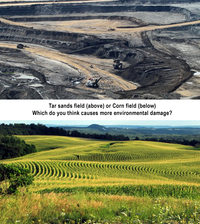Truth, Lies and Ethanol
 |
By Andres R. Aquino
CEO of OMEGA FUELS
There is an ancient saying that maintains that the first person to state his case seems right until he is cross-examined. As in all things, there are always two sides to the same story, but when only one side of the story is repeatedly presented, it is easy to believe that side is the correct one. This is no less true when it comes to the debate surrounding ethanol in our fuel. A person can readily find articles and news stories warning of the evils of ethanol and why we should remove it as a fueling option. However, when these articles are cross-examined and a more complete picture is presented, the points that these articles make tend to fall apart. It is my goal to present the other side of the story, and only after seeing a more complete picture do I invite you to judge between the two.
First, I think it's worthwhile to explain why ethanol is even added to gasoline. Before gasoline can be delivered to stations and made available for general use, it needs to be blended with octane boosters in order to achieve the higher octane grades of 87, 89 and 93. Traditionally, the hazardous BTEX chemicals of benzene, toluene, ethylbenzene and xylene have been added in order to reach the appropriate octane levels. However, these compounds have harmful effects on the central nervous system and are known carcinogens - facts which can be investigated via the www.cancer.org website. Now this is where ethanol comes in. Ethanol is a non-hazardous option which increases fuel's octane without the need for the carcinogenic chemicals already mentioned, and the best part is that ethanol is produced right here in America. This translates to more jobs, money for our economy, more choices at the pump, and less dependence on foreign oil.
Despite the harmful octane boosters that ethanol replaces, many critics still maintain that there are consequences to using ethanol that outweigh this good. Probably one of the most hackneyed complaints leveled against ethanol is that it reportedly raises food prices. After all, ethanol in America is largely produced from corn, so if we're using corn for fuel instead of corn for food, of course the food prices would increase. Right? This is where the beauty of cross-examination comes in. It is true that the corn used for ethanol is the same type of corn used to feed livestock. However, what is not commonly known is that ethanol production actually results in protein-rich distiller's grains, which are better for feeding livestock than the corn itself. Not only that, ethanol production also results in highly-profitable corn oil which can be used both for human consumption and for making bio-diesel. In short, instead of growing a crop of corn and using it only for animal feed, the same crop can now be used to produce higher-quality animal feed, multi-use corn oil and cleaner-burning fuels while yielding more income for our struggling farmers. Furthermore, the ethanol market has led to increased corn production, and the result is that corn prices are the lowest that they've been in years. How would lower corn prices lead to higher food prices?
 |
Another complaint leveled against ethanol is that it isn't environmentally friendly at all. Critics claim that even though ethanol produces 4 times less carbon dioxide than gasoline, its production leads to land decimation, the use of pesticides, and water contamination - not to mention it still requires gasoline or diesel to power the vehicles used in producing and hauling it. This sounds quite terrible, doesn't it? That is, it sounds terrible until you consider the alternative. Does anyone remember Deep Water Horizon? What about the other (largely unpublicized) oil spills that have occurred since January this year (Amazon River spill January 25th & February 3rd, Gulf of Mexico spill May 12th, City of Ventura, CA spill June 23rd)? What about the land decimation and water contamination that results from oil drilling and fracking? Just compare a picture of the tar sands in Alberta Canada to a picture of a field of corn, and the stark difference between the two becomes quite clear. Let us not also forget that oil production requires its own fair-share of gasoline-powered vehicles and boats, and we still have the air pollutants that are released to our environment with each daily vehicle operating on the road. Even if the "decimation" resulting from ethanol production were quite as bad as many make it out to be, I dare say it pales in comparison to the real devastation caused by oil production and use.
However, the good news is that ethanol production has actually been refined a great deal over the past several years so that it is much more efficient and creates a much smaller impact than before. Farmers are more educated about the use of pesticides, crops are rotated to allow for nutrient replenishment and less water is required for the process all together. The even better news is that ethanol produced from corn isn't the only option. In fact, ethanol can be produced from a variety of materials such as bio-waste and woodchips (cellulosic ethanol) and even from algae. The more we allow these technologies to develop and enter the market, the more efficient and stream-lined the process of producing ethanol will become.
This brings me to a final, major complaint against ethanol. It is that ethanol seems to destroy engines and fuel systems, especially in regards small motors such as lawn mowers and weed-whackers. First, let's try to get the facts straight. It is true that ethanol eats away at natural rubbers. That's why particularly old vehicles or gasoline-powered devices are not compatible with this fuel. However, since about the 1990's, vehicles and other devices have been manufactured synthetic fuel lines, and these synthetic materials are fully compatible with ethanol.
It's also true that ethanol absorbs water whereas gasoline repels it. However, this actually serves as a benefit. If your gas tank gets some moisture or condensation inside of it, the ethanol with absorb that moisture and allow it to be burned out through the combustion process. With gasoline, however, the moisture just settles on the bottom of your fuel tank and, over time, can cause corrosion. In addition, since ethanol is cleaner-burning, it actually helps to clean your injectors and preserve the life of your engine. Yet regardless of these facts, many will still claim that since ethanol was added to regular gasoline, their lawn mowers and small engines just haven't been the same. The reason? As was mentioned before, ethanol increases fuel's octane. As a result, oil companies are now using subgrade 84 octane gasoline, mixing it with ethanol, and selling it as 87 octane gasoline - the very gasoline you're using at the pump. It's not the ethanol that's the problem. The problem is the subgrade gasoline that the oil companies are using. Don't believe me? Try using premium 93 in your lawn mower. It's still mixed with up to 10% ethanol. The difference is that it's also produced with a higher grade of gasoline. For those of you who enjoy a more scientific experiment, cut two pieces of fuel line and place one piece in a jar of E85 and the other piece in a jar of ethanol-free gasoline. Over time, you'll clearly be able to see the difference between the two pieces, and the true culprit of your lawn-mower's demise won't be hard to find.
A person also needs to consider that if ethanol were such an inefficient, harmful fuel, would top engine builders and organizations such as NASCAR, Formula 1, Formula Drift (as well as many individual, pro-street racers) be using it? Contrary to popular opinion, a careful look at the evidence shows ethanol as the better fuel for your health, your vehicle, our nation and our environment.
Holding a graduate degree in chemistry and having worked as a chemist for the Department of Homeland Security, Andres Aquino is an auto enthusiast and has experience researching and testing bio-fuels. He is also the founder/CEO of Omega Fuels. For more information about Omega Fuels visit http://www.myomegafuels.com.


